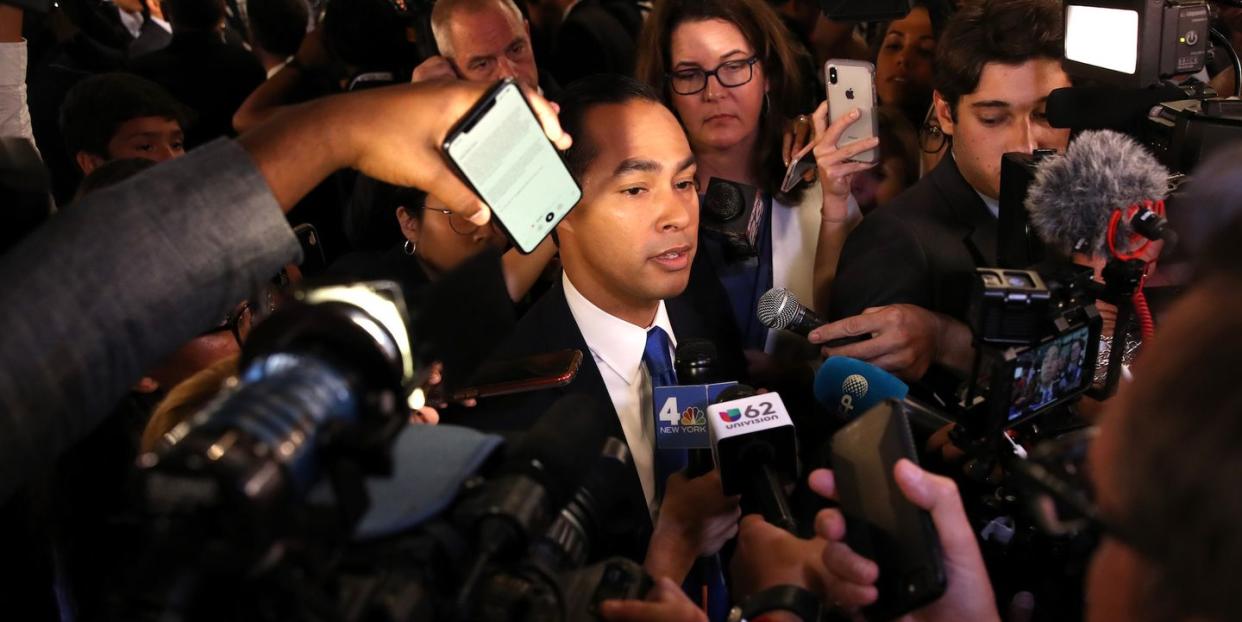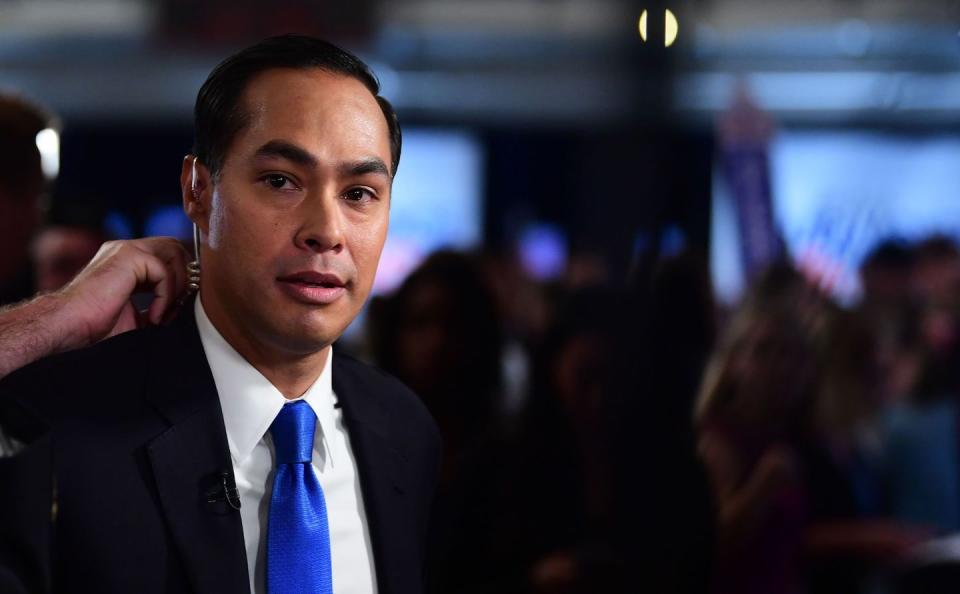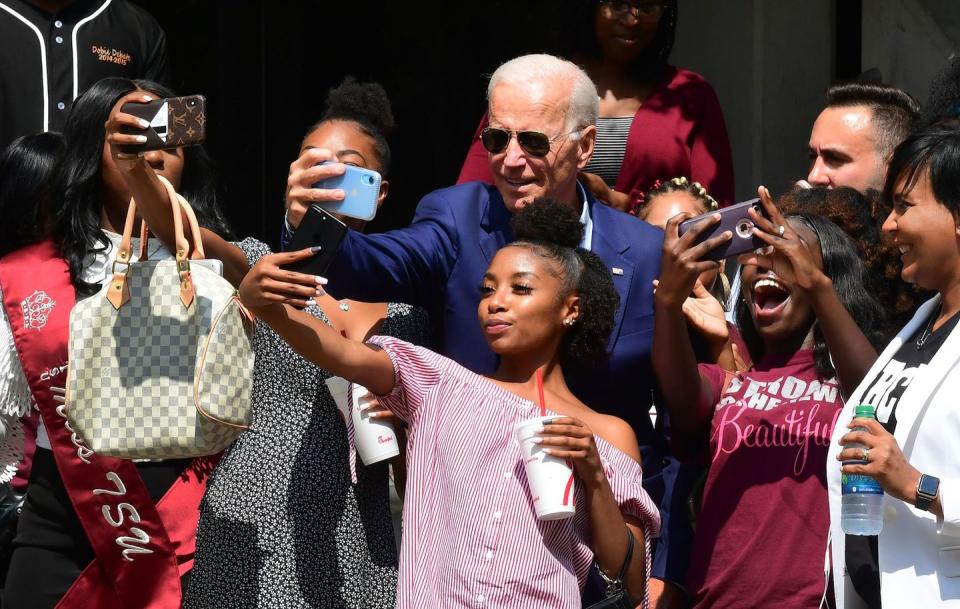Julian Castro Played the Heel in South Carolina This Weekend, But He's No Villain

COLUMBIA, SOUTH CAROLINA—Julian Castro spent his first week as the designated heel in the traveling Democratic Royale Rumble by rolling through South Carolina, stopping at a Mexican festival in Greenville, and at the University of South Carolina in Columbia, and at a Honduran restaurant across town. (The restaurant's bar featured a non-alcoholic special called a "Julian," a tasty calorie-bomb with lots of coconut in it and only one serious drawback: it was green. Don't drink green stuff, people, in case peristaltic circumstances require you to reacquaint yourself with it.) It also was the day before the 45th birthday that he shares with his twin, Congressman Joaquin Castro. At the university, he crossed paths with New York Mayor Bill deBlasio—Yes, Virginia, he's still running. God knoweth why.—who wished him the congratulations of the day. "I'm 45," Castro said. "They say that 45 is the beginning of middle age, so, I guess I'm middle-aged now."
In the Democratic debate last week, Castro put himself in the position of being the field's designated villain by pointing out that Joe Biden had misstated his own healthcare plan, and asking Biden if he'd forgotten his own position. The post-debate analysis was uniformly negative. My dear young man, this simply is not done. Castro found himself arraigned in the Court of Common Punditry of Presumption in the First Degree. How dare this...person speak that way and scare all the horses?

"Probably raised my name ID," Castro said with a laugh. "So that's good. People have different takes on it. I just wanted to get up there and have a conversation about the different paths we have to take." But the byplay about healthcare plans was the lesser of two confrontations between Biden and Castro. The more important one—and certainly, the most interesting one—came shortly thereafter, when the two former Obama administration officials confronted each other over which one of them was running as the true heir to the Obama legacy.
CASTRO: ...we owe a debt of gratitude to President Barack Obama. Of course, I also worked for President Obama, Vice President Biden, and I know that the problem with your plan is that it leaves 10 million people uncovered.
Now, on the last debate stage in Detroit, you said that wasn't true, when Senator Harris brought that up. There was a fact check of that, and they said that was true. If they choose to hold on to strong, solid private health insurance, I believe they should be able to do. But the difference between what I support and what you support, Vice President Biden, is that you require them to opt in and I would not require them to opt in. They would automatically be enrolled. They wouldn't have a buy in...That's a big difference, because Barack Obama's vision was not to leave 10 million people uncovered. He wanted every single person in this country covered. My plan would do that. Your plan would not.
It automatically enrolls people regardless of whether they choose to opt in or not. If you lose your job, for instance, his health care plan would not automatically enroll you. You would have to opt in. My health care plan would. That's a big difference. I'm fulfilling the legacy of Barack Obama, and you're not.
BIDEN: That'll be a surprise to him.
The former president's popularity among Democrats of all stripes—and, indeed, his popularity in the country at large—is so unassailable that the Democratic candidates this time around have to find a way to move his policies ahead without seeming to insinuate that Obama either was wrong or timid. For Biden, it's easy to do that. You simply line up behind all of the successful policies and say that you'll return the American government to sanity. For everyone else, it's a tough needle to thread.
"How do we build on the progress that the Obama administration made and then take that to the next level," Castro said. "There are always ways that we can build on and improve on what a previous administration did."

He is a unique figure among the heretofore single-digit crowd. In every debate, he has taken the issues being discussed and brought to them another dimension. In the first debate, in discussing immigration, he befuddled many of the other people on the stage by specifically calling for the repeal of Section 1325 of the Immigration and Nationality Act of 1927, a provision that made crossing the border a criminal misdemeanor, and that the present administration* has weaponized as a rationale for locking people up and separating families at the border. He never fails to mention the oppression of the Uighur people when discussing China. And when discussing criminal-justice reforms, he leans hard into the need to reform local police departments in order to wring out of them the racism and the climate of violence that has led to so many high-profile incidents in which minority citizens end up dead. (While discussing this issue, Castro never fails to recite a litany of the names of the victims of police violence.) For decades, Democratic candidates have been terrified of police unions and of being tarred as soft on crime by, among other people, police unions.
"Chicago is a good example," he said. "As you know, there was a consent decree that the federal government was pursuing under President Obama that Trump took his foot off the gas on and let them off the hook. The president can help improve policing around the country directly by appointing an attorney general, as well as United States attorneys, who are going to take the issue of excessive force seriously and pro-actively work with local police departments to make sure that they're respecting civil rights and, when they're not, take necessary action to get them into compliance. The Trump administration hasn't done that at all.
"On top of that, every opportunity we have in grant programs in the executive branch, we want to find ways for these communities to do the right thing. Ultimately, though, we need Congress to make fundamental change. I've called for national use of force standards and local action to mend the rifts between the police and certain communities.
"In so many ways, that issue is a third rail. I wanted to put the issue of police reform right out front to say, look, this is important and we need to address it."
It is now cliché—and undeniably true—that everybody running for the Democratic nomination would be a better president than the president* we have now. The same probably can be said of his three Republican challengers, and, for that matter, all the furry woodland creatures presently gamboling through the meadows, and most of the lawn furniture you're putting away for the winter. There are no real villains here. Just presidents we haven't met.
Respond to this post on the Esquire Politics Facebook page here.
You Might Also Like

